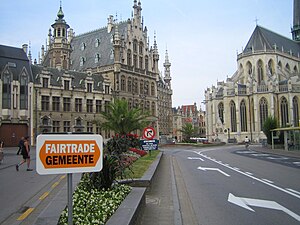Fairtrade Town

Fairtrade Town is a status awarded by a recognized Fairtrade certification body (i.e. the Fairtrade Foundation in the United Kingdom, TransFair Canada in Canada etc.) describing an area which is committed to the promotion of Fairtrade certified goods. By extension, the organizations also award the statuses of Fairtrade City, Fairtrade Village, Fairtrade Zone, Fairtrade Borough, Fairtrade Island, Fairtrade Country and Fairtrade University.
See List of Fairtrade settlements for a list of current Fairtrade settlements.
History
The Fairtrade Town campaign was first launched in 2001 in Garstang, Lancashire, under the initiative of Bruce Crowther, a local Oxfam supporter, and the Garstang Oxfam Group. The initiative, which aimed to promote Fairtrade certified goods in the town, was highly successful: within a couple of months, awareness of the Fairtrade Mark jumped to over 70% in the town while sales of Fairtrade certified goods increased significantly. Moreover, over the course of the campaign, Garstang developed links with Fairtrade cocoa farming communities in West Africa, which led to the twin town relationship with New Koforidua, Ghana.[1]
As the activities at Garstang gained wider attention, the Fairtrade Foundation launched a set of Fairtrade Town Goals and an Action Guide to encourage others to follow in the town's success. During the 2001-2006 period, over 209 British towns were awarded the Fairtrade status by the Fairtrade Foundation. In October 2009 448 British towns and 312 towns worldwide awarded the Fairtrade status (in total 760).
In an attempt to replicate the success of the Fairtrade Foundation's Fairtrade Town program, a Europe-wide program called "Fairtrade Towns in Europe", part-funded by the European Commission, was launched jointly by several Fairtrade labelling initiatives.
In November 2006, the first ever European Fairtrade Towns conference was hosted at London Southbank University. The goals of the conference were to
- identify and develop procedures to strengthen the links within and between local communities and private and public organisations;
- develop strategies to enable the UK Fairtrade Towns model to meet the requirements of each individual country.
Following the success of the first event, a second Fairtrade towns conference was subsequently held in Brussels in January 2008.
There are currently Fairtrade Towns in Australia, Austria, Belgium, Brasil, Canada, Denmark, Finland, France, Ireland, Italy, Norway, Spain, Sweden, the Netherlands, Germany, the United Kingdom and the United States. See List of Fairtrade settlements for a list of current Fairtrade settlements.
Criteria

Formal guidelines have been produced jointly by several FLO member Fairtrade labelling initiatives. In order to be awarded Fairtrade status, an area must meet five criteria:
- Local council passes a resolution supporting Fairtrade, and agrees to serve Fairtrade tea and coffee at its meetings and in its offices and canteens.
- A range of (at least two) Fairtrade products is readily available in the area’s shops and local cafés/catering establishments.
- Target for number of retail outlets: population of < 10000 - 1 retail outlet per 2500; population < 200000 - 1 retail outlet per 5000; population of < 500000 - 1 retail outlet per 10000.
- Target for number of catering outlets: population of < 10000 - 1 catering outlet per 5000; population < 200000 - 1 catering outlet per 10000; population of < 500000 - 1 catering outlet per 20000
- Fairtrade products are used by a number of local work places (estate agents, hairdressers etc) and community organisations (churches, schools etc)
- Attract media coverage and popular support for the campaign.
- A local Fairtrade steering group is convened to ensure continued commitment to its Fairtrade Town status.
Other initiatives
Fairtrade nation
In 2002 The Wales Fair Trade Forum, a network of development NGOs and Fair Trade campaigners, began working to make Wales the world's first Fair Trade country. The idea was based upon the Fairtrade Town scheme run by the Fairtrade Foundation in the UK. In 2005 The Welsh Assembly Government agreed to back the idea and in 2006 Fair Trade groups from Scotland and Wales agreed the criteria for becoming a Fair Trade country.
The draft criteria for a "Fair Trade Nation" are:[1]
- 75% of the population should purchase a Fair Trade product every year.
- 40% of people regularly buy Fair Trade products.
- All local authorities have active Fair Trade groups working towards Fairtrade status.
- 55 per cent local authority areas with Fair Trade status with 10% annual increase in following years
Wales became the world's first Fairtrade nation in June 2008.
See also
References
- ^ Garstang Fairtrade Town (2002). Garstang Fairtrade Town. URL accessed on December 14, 2006.
External links
- Garstang - The world's first Fairtrade Town
- Fairtrade Austria - information on the campaign in Austria
- Max Havelaar Belgium - information on the campaign in Belgium
- TransFair Canada - information on the campaign in Canada
- Max Havelaar France - information on the campaign in France
- TransFair e.V. - information on the campaign in Germany
- Fairtrade Ireland - information on the campaign in Ireland
- TransFair Italia - information on the campaign in Italy
- Fairtrade Gemeente - information on the campaign in the Netherlands
- Fairtrade Max Havelaar Norge - information on the campaign in Norway
- Ciudad por el Comercio Justo - information on the campaign in Spain
- Rättvisemärkt - information on the campaign in Sweden
- Fairtrade Foundation - information on the campaign in the UK
- Fair Trade Towns USA - information on the campaign in the US
